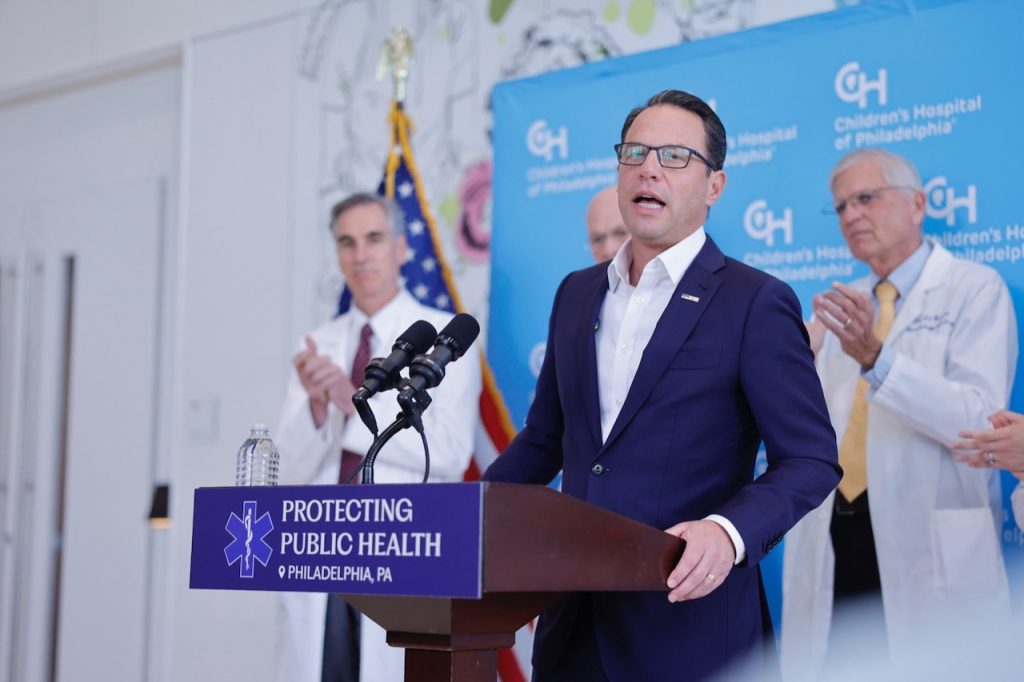Listen to the article
Pennsylvania Governor Josh Shapiro has signed an executive order aimed at protecting vaccine access and combating misinformation across the state, a move health professionals are calling a critical step in safeguarding public health.
The order, signed on October 1, 2025, establishes comprehensive measures to ensure Pennsylvanians maintain access to vaccines while addressing the growing concern of vaccine misinformation that has contributed to declining immunization rates statewide.
According to health officials familiar with the order, the initiative will strengthen insurance coverage requirements for vaccines and implement educational campaigns to counter the spread of false information about immunizations. The governor’s office emphasized that the action comes in response to recent outbreaks of preventable diseases across several Pennsylvania counties.
“This executive order represents a commitment to public health based on scientific evidence,” said Dr. Maria Hernandez, Pennsylvania’s Health Secretary. “We’ve seen troubling declines in vaccination rates that directly correlate with the spread of misinformation on social media and other platforms.”
The Centers for Disease Control and Prevention (CDC) reported in 2023 that vaccine misinformation has contributed significantly to outbreaks of measles and pertussis (whooping cough) in multiple states, including several clusters in Pennsylvania’s more densely populated regions. These outbreaks have particularly affected vulnerable populations, including infants too young to be fully vaccinated, elderly residents, and immunocompromised individuals.
Healthcare workers across the state have expressed strong support for the governor’s action. Stacey Myers, a Registered Nurse and student at Millersville University’s Wehrheim School of Nursing, described the measure as “essential for community health.”
“As someone working directly with patients, I’ve witnessed the devastating consequences of vaccine-preventable diseases,” Myers said. “This order addresses both the practical barriers to vaccination and the information crisis that has undermined public trust in well-established medical science.”
The order specifically targets insurance practices that could limit vaccine accessibility. Under the new directive, insurance providers operating in Pennsylvania will face stricter oversight regarding vaccine coverage policies, ensuring that cost does not become a barrier to preventive care.
Public health economists note that vaccines remain among the most cost-effective medical interventions available. A 2024 study from the University of Pittsburgh found that for every dollar spent on childhood vaccines in Pennsylvania, approximately $10 is saved in direct healthcare costs and economic productivity.
“Denying access to vaccines based on cost is not only unethical but economically unsound,” explained Dr. Jonathan Fielding, health policy analyst at Carnegie Mellon University. “This order recognizes that vaccination is both a public health necessity and fiscally responsible governance.”
The executive order also establishes a task force comprising health officials, communication experts, and community representatives to develop strategies for countering vaccine misinformation. This group will coordinate with school districts, healthcare facilities, and community organizations to disseminate accurate information about vaccine safety and efficacy.
Some critics have questioned whether the order could infringe on personal freedoms, but legal experts suggest the measures fall well within the governor’s authority to protect public health.
“The order focuses on ensuring access and accurate information, not mandating vaccination,” clarified Pennsylvania Bar Association health law specialist Patricia Montgomery. “It preserves individual choice while addressing systemic barriers and information quality.”
Implementation of the order will begin immediately, with the Department of Health expected to release detailed guidelines for healthcare providers and insurance companies within 30 days.
Health officials emphasize that the success of these measures will ultimately depend on community engagement and rebuilding trust in public health institutions – a challenge that extends beyond any single executive action.
Verify This Yourself
Use these professional tools to fact-check and investigate claims independently
Reverse Image Search
Check if this image has been used elsewhere or in different contexts
Ask Our AI About This Claim
Get instant answers with web-powered AI analysis
Related Fact-Checks
See what other fact-checkers have said about similar claims
Want More Verification Tools?
Access our full suite of professional disinformation monitoring and investigation tools




12 Comments
As a healthcare professional, I’m glad to see government leaders taking concrete steps to address vaccine hesitancy. Education and expanding access are sensible approaches, but the details will be key.
Absolutely. Ongoing monitoring and stakeholder engagement will be essential to ensure these initiatives are effective and responsive to evolving needs.
While I appreciate the governor’s focus on public health, I have some concerns about potential unintended consequences of mandates or heavy-handed tactics. Balancing individual liberty and collective wellbeing is delicate.
That’s a fair point. Policymakers will need to carefully consider the rights and concerns of all stakeholders as they implement these measures.
As a nursing student, I’m encouraged to see the state taking proactive measures to safeguard vaccine access and counter misinformation. This aligns with our profession’s focus on preventative care.
Absolutely, healthcare workers are on the front lines of this issue. Policies that empower them to provide accurate, science-based information to patients are crucial.
Recent disease outbreaks underscore the need for strong public health policies. This order appears aimed at addressing systemic issues – I hope it leads to meaningful improvements in vaccination rates.
Agreed. Tackling misinformation and ensuring equitable access are critical to protecting vulnerable populations and enhancing community resilience.
Vaccine hesitancy is a complex challenge, so a multi-pronged approach like this executive order seems prudent. I’m curious to learn more about the specific educational campaigns planned.
Good point. The details around the public awareness efforts will be important to evaluate their potential impact and effectiveness.
Interesting move by Governor Shapiro to address vaccine misinformation and access challenges. Protecting public health through evidence-based policies seems prudent, though the details will be important.
Yes, this order aims to tackle a concerning trend of declining vaccination rates. Strengthening insurance coverage and public education are reasonable steps to improve public health outcomes.